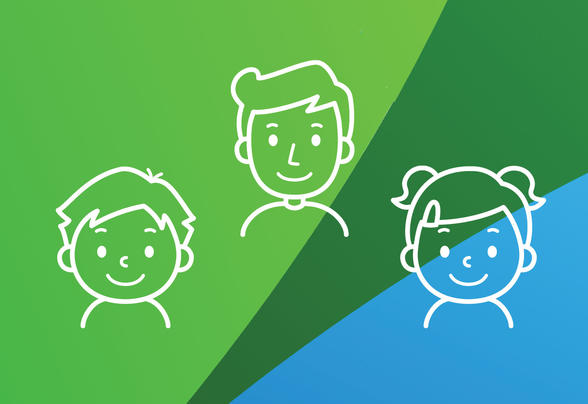Children and young people are exposed to information about COVID-19 in multiple ways, including through conversations with and around them and via mainstream and social media.
They will experience a range of responses even if they don’t always fully understand the information. Children and young people cope better if they are provided with accurate, age-appropriate information, along with opportunities to talk and discuss what is happening.
General
- Families and caregivers should discuss the pandemic in an open and honest way. Age-appropriate language and discussions should include clear information about how to reduce their risk of being directly affected. It is important to listen to any questions they have, and to let them know they are safe and it’s normal to feel concerned.
- News and Social media can be overwhelming. Help and encourage children and young people to limit their exposure. This video provides useful tips.
- Regardless of age, children are likely to feel a range of emotions and exhibit a variety of behaviours. This could include becoming clingy, angry, anxious or withdrawn, or bedwetting.
- Children will react at different times. Some react immediately, while others may show signs later. Children’s reactions and the common signs of distress can vary according to age, previous experiences, and how they typically cope with stress.
- Respond in supportive, gentle and reassuring ways, including by listening to concerns and giving extra love and attention.
- Provide opportunities for play and relaxation where possible.
- Keep to regular routines and schedules where possible or help create new ones.
- Children’s reactions are influenced by how they see adults around behaving. When parents and caregivers deal with traumatic events calmly and confidently, children are better supported.
- Lead by example. Set a good example by managing your stress through healthy lifestyle choices, such as eating healthily, exercising regularly, getting enough sleep, and avoiding drugs and alcohol. Adults who are prepared, rested and relaxed respond better to unexpected events and can make decisions in the best interests of those they care for.
The Queensland Aboriginal and Islander Health Council have developed culturally appropriate resources,
Beyond Blue has advice on maintaining mental health and wellbeing.
If you’re a practitioner, try to keep children close to their parents/family/caregivers, avoiding separation as much as possible. If separation occurs (such as through illness or hospitalisation), ensure regular contact by phone or other technology and provide reassurance.
Supporting infants and preschoolers
Infants can become “cranky”, cry more than usual or want to be held and cuddled more.
Preschool and kindergarten children may have tantrums or sleeping difficulties, and could revert to behaviours they had outgrown, such as bedwetting and toileting accidents. They could be frightened about being separated from parents or caregivers.
Helpful resources
The Queensland Mental Health Commission is maintaining and updating COVID-19 information and mental health resources on our Coronavirus and mental health website.
Zero to Three's tips for families of young children include age-appropriate responses to common questions, a guide to self-care, and activities for young children experiencing social distancing.
The Queensland Government's Birdie and the Big Sickness is a free online storybook to help children deal with frightening or upsetting situations. Playing a therapeutic game or reading a story with a caring adult can help a young child work through the scary experiences and ‘big feelings’. There’s information for parents and carers too. There's also an Auslan version.
Children’s Health Queensland is modifying Birdie to create Birdie and the Virus, incorporating hand-washing, the wearing of masks, nasal swap procedures, and a song to help teach key infection control measures.
Brainpop has a guide to explain COVID-19 in simple language to children.
The Sydney Morning Herald has a guide that answers young children’s coronavirus questions in age appropriate ways.
Supporting children, pre-teens and teenagers
Older children may feel sad, angry or afraid. They could be exposed to false information shared by friends and peers. Parents and caregivers can help by providing correct information.
Older children may focus on details of the situation. They could have trouble concentrating and might want to talk about the situation constantly -- or not at all.
Some pre-teens and teenagers could respond by acting out, including breaking rules, driving recklessly, or using alcohol or other drugs. Others could become afraid to leave the home even for essential matters. They could isolate themselves physically and virtually from friends and family. They could feel overwhelmed by intense emotions and feel unable to talk about them. Emotional reactions could lead to
increased arguing and fighting with siblings, parents, carers or other adults.
Helpful resources
Emerging Minds has a resource for communicating with children about COVID-19, while Unicef Australia has tips to help comfort and protect children when discussing COVID-19.
Beyond Blue has information to support educators, children and young people during COVID-19.
Headspace also has advice for young people affected by stress related to Novel Coronavirus (COVID-19).
Strengthening family relationships
Social distancing measures create more time for families to spend together. Parents and carers may be wondering how to support and engage with their children and strengthen their relationships.
Helpful resources
This podcast by Sarah Seekamp talks about the importance of play for child social and emotional wellbeing and is supported by practical resources to promote the mental health of children and support playtime with children.

